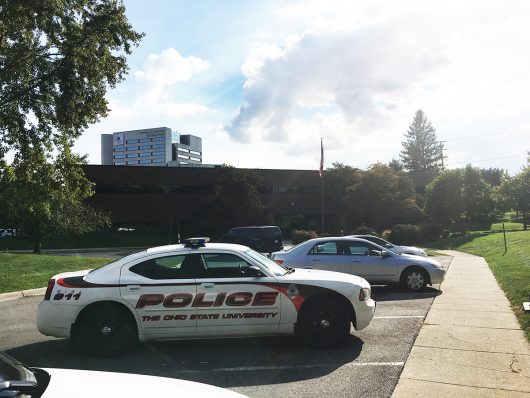
The Community Police Academy will take place at Blankenship Hall. Credit: Dan Smyth | Lantern Reporter
Members of the Ohio State community will have an opportunity to see what it is like to be a police officer, thanks to the new Community Police Academy held by University Police.
Participants must be current students, staff or faculty, at least 18 years of age and are required to pass a background check.
University Police Chief Craig Stone said the course is open to more than those just interested in law enforcement.
“I think it might be interesting to them, an eye-opener. They’ll get to see other facets of the Department of Public Safety,” Stone said.
Participants will receive active-shooter, civilian-response training, discuss the use of force and body cameras, perform mock crime scene investigations, participate in role-playing activities, and learn to process fingerprints and photographs of prisoners.
The program also will include a two-hour ride-along with a University Police officer.
“The instructors hope they can learn from the students, faculty and staff about their perspectives and any concerns they have.” — Detective Cassandra Shaffer, one of the instructors of the academy.
During the ride-along, participants will be in the front seat with an officer and they will help perform building checks, bike rack surveillance, routine patrols, traffic stops or accompany the officer on service calls, said detective Cassandra Shaffer, one of the instructors of the academy.
Although participants will not receive academic credit from the academy, there will be a formal graduation ceremony with certificates and T-shirts.
“We want to expose them as much as we can to the Department of Public Safety,” Stone said.
The learning experience is intended to be twofold, benefitting officers as well, Shaffer said.
“The instructors hope they can learn from the students, faculty and staff about their perspectives and any concerns they have,” Shaffer said. “We are also hoping that a safe, open platform for constructive debate will occur, causing both officer and participant to see the challenges that law enforcement face. We also expect the officers to gain insight, such as how the actions of law enforcement are perceived, and what can be done to have a better relationship with the community.”
The Community Police Academy is a four-week program starting Wednesday at Blankenship Hall and is free of charge for those who applied to the program. For those who missed the Saturday deadline, there is another Community Police Academy scheduled for Spring Semester.
“We cannot do our job effectively without the public’s assistance,” Shaffer said. “We need their assistance just as they need ours. The better and stronger that relationship is, the better we as a department can serve our community.”


